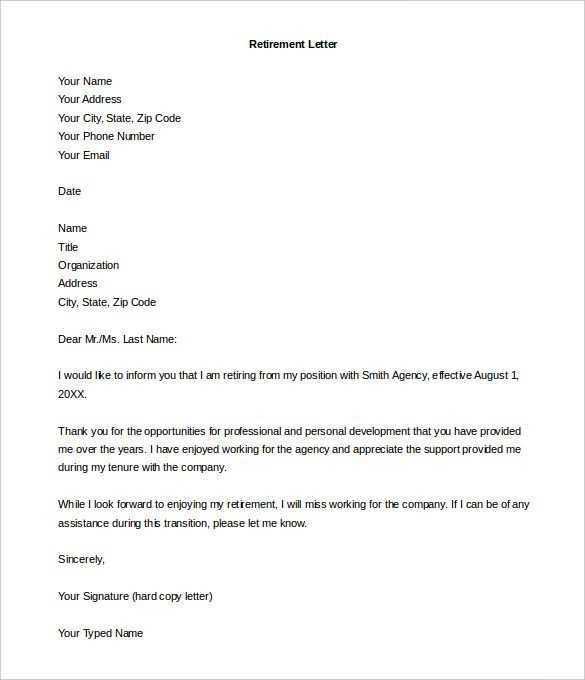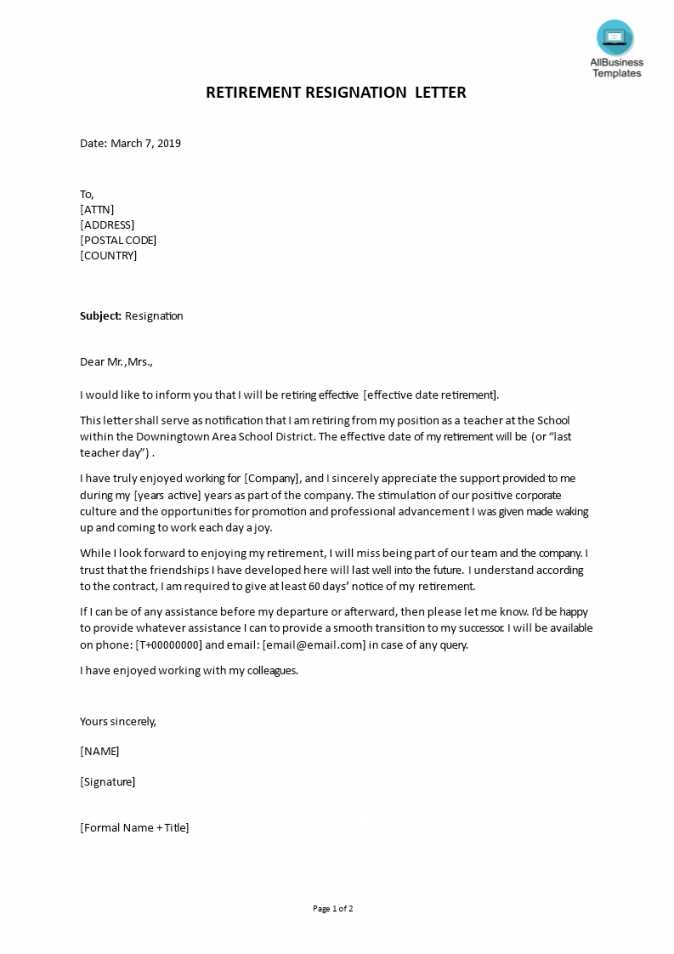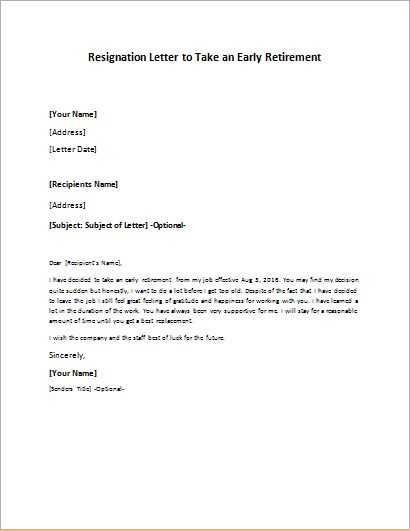Template for retirement letter to employer

Begin your retirement letter by clearly stating your intention to retire and specifying the effective date. This allows your employer to plan for the transition. Use a formal tone, while maintaining a friendly and appreciative attitude towards your company and colleagues. Offering gratitude for the opportunities you had can make your message more heartfelt and memorable.
Example: “I am writing to formally announce my retirement from [Company Name], effective [Retirement Date]. It has been a privilege to be part of such a dynamic team for [Number of Years].”
After stating your retirement plans, it’s a good idea to express appreciation for your time with the company. Recognize any experiences that had a positive impact on your career. If applicable, mention how much you’ve valued your colleagues’ support and the opportunities to grow professionally.
Example: “I have truly enjoyed working alongside talented and dedicated colleagues. The experiences and challenges over the years have been invaluable, and I’m grateful for the chance to contribute to [Company Name].”
Finally, offer assistance with the transition process, such as training a successor or preparing any necessary documentation. This ensures a smooth departure and leaves a positive impression on your employer.
Example: “I’m happy to assist with the transition in any way possible, whether it’s by training my successor or helping with ongoing projects.”
Here’s the revised version:
When preparing your retirement letter, focus on being clear and concise. Your letter should include the date of your retirement and a statement of gratitude for the opportunities you’ve had during your employment. Start by thanking your employer and colleagues for their support and collaboration. This will leave a positive impression.
Key Elements to Include

1. Mention your retirement date clearly. This ensures there is no confusion about your last day.
2. Express your appreciation. Recognizing the impact of your work environment and people you’ve worked with adds a personal touch.
3. Offer help during the transition period. Show that you care about a smooth handover by offering your assistance with any necessary tasks.
4. Keep the tone professional. Your letter should convey respect for the company and the people you’ve worked with.
By following these guidelines, your retirement letter will be a professional and thoughtful farewell.
Template for Retirement Letter to Employer
How to Begin Your Retirement Letter: Key Elements to Include
Choosing the Right Tone: Professional or Casual?
When to Submit Your Retirement Letter: Timing Considerations
Important Details to Mention in Your Retirement Letter
How to Express Gratitude in Your Retirement Letter
Final Steps: Ensuring a Smooth Transition After Retirement
Start by addressing your employer directly, using a formal salutation like “Dear [Manager’s Name].” Make sure to clearly state your intention to retire and provide your retirement date. Specify your last working day to help the company prepare for your departure.
Key Elements to Include
Your retirement letter should be concise but contain the essential information: your retirement date, acknowledgment of your time with the company, and gratitude for the opportunities provided. Don’t forget to express appreciation for your coworkers and leadership, ensuring that your tone remains respectful and positive.
Choosing the Right Tone: Professional or Casual?
Maintain professionalism regardless of your relationship with your employer. A formal tone is usually expected, but if you’ve had a more casual relationship with your boss, it can be acceptable to adjust the tone slightly. Always focus on clarity and respect.
When to Submit Your Retirement Letter: Timing Considerations
Submit your letter at least a few months before your planned retirement date. This allows ample time for your employer to manage transitions, whether that means finding a replacement or adjusting workloads. The standard is to give a two-week notice, but more time is ideal in most cases.
Important Details to Mention in Your Retirement Letter
Beyond your retirement date, include any necessary information about ongoing projects, handover plans, or pending tasks that need attention before you leave. Offer to assist with the transition to ensure a smooth handover.
How to Express Gratitude in Your Retirement Letter
Thank your employer and team for their support throughout your career. Mention specific experiences or growth opportunities that made your time at the company valuable. A heartfelt, sincere message will leave a lasting impression.
Final Steps: Ensuring a Smooth Transition After Retirement

Before leaving, confirm any final tasks or responsibilities. Offer assistance with training a successor or completing outstanding projects. This will demonstrate your commitment to a smooth handover and leave a positive legacy at the company.